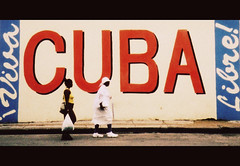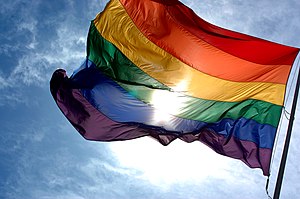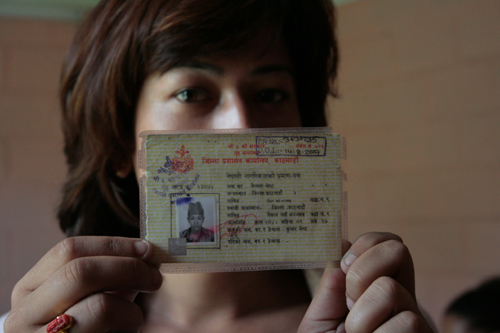Source:
The Guardian
By Kate Hodal
It was anything but a normal wedding. The identity cards were forged, the groom’s parents refused to attend and only a handful of friends were invited. The event was so taboo it could have ended with the bride and groom in jail.
“That day I felt like a freedom fighter, like liberty itself,” 28-year-old Noah says of his Indonesian wedding, with the photograph album of last year’s ceremony spread open across his knees. “But the truth is, we have no choice but to keep it a secret.”
“It” is the fact that Noah, a small-boned man with teenage acne, a gelled-back crew cut and wispy mustache, is not yet — in the eyes of his government — a man.
One of a growing number of transgender Indonesians, Noah — who was born female, but is now pre-op female to male — is defying considerable sociocultural taboos in the world’s most populous Muslim country to become who he feels he is: “A man who just wants to be with the person I love.”
“There’s no shortcut for this,” he says, quietly, of his transgender life. “You have to plan everything — how to fit into society, how to act like a man, how to behave ‘normally.’ If you don’t, you face discrimination — and physical, sexual and verbal abuse.”
There are no official figures for the number of transgender people currently living in Indonesia. “She-males” — or waria — are some of the most socially visible, with the most famous among them, talkshow host Dorce Gamalama, considered the Indonesian Oprah.
COSTLY PROCESS
However, the transgender life is not easy in Indonesia. While legally allowed to marry, they can do so only after successfully completing realignment surgery, a prohibitively expensive process which costs 200 million rupiah (US$22,600). They must also wait for a government-issued identity card declaring their new gender.
In a nation where the average annual income is 20 million rupiah, many transgenders and their partners are forced instead to lead what are, technically, same-sex relationships.
“This is a gray area in Indonesian law,” says Yuli Rustinawati of the Jakarta-based lesbian, gay, bisexual and transgender (LGBT) charity Arus Pelangi (Rainbow Stream). “The national government recognizes sex, but not gender, or — in other words — the result of realignment surgery, but not the process.”
While neither LGBT persons nor same-sex relations are prohibited by the Indonesian state of 240 million, 80 percent of whom are Muslim, local governments vary in how they handle it.
Many states, such as south Sumatra, use anti-prostitution laws to restrict the rights of LGBT people, where “prostitution” is widely defined to include homosexual sex and lesbianism, as well as pornography and sexual abuse. In the Shariah state of Aceh, gay sex is punishable by jail, while waria, once nationally deemed cacat, or mentally ill, are now categorized along with the homeless as a “social welfare problem.”
STILL OUTSIDERS
According to Sardjono Sigit of Gaya Nusantara, an LGBT rights group based in Surabaya, east Java, such laws simply prove that: “LGBT people in Indonesia are still regarded as freaks who are part of some ‘special community.’”
“As an ‘entertainer,’ an LGBT person can be free to express their sexuality as part of their ‘performance,’ but in daily life, they’re still expected to behave as heterosexuals,” he says.
LGBT rights have recently gained exposure thanks to the Indonesian human rights commission and a new, official network of HIV/AIDS programs. However — and possibly as a response to the nation’s exacting cultural mores — reports of unusual marriages such as Noah’s have surged in the past few months, from small villages in Aceh to the capital city of Jakarta.
Mainly involving seemingly heterosexual couples who are later found to contain a transgender partner, the stories have flummoxed locals and officials alike.
The latest report, of two women who married as a heterosexual couple, but were later exposed by neighbors to be lesbians, created a stir when the local religious police threatened to behead the women and set them alight as punishment for their “embarrassing and forbidden” behavior.
While local rights groups concede that the Indonesian LGBT movement has gained considerable ground in the last five years, so too has the fundamental Islamic movement, Rustinawati says.
“Many communities now send LGBT people to pasantran [Islamic boarding schools] for ‘sexual re-education,’” she says. “LGBT conferences have been canceled and the Q! [queer] film festival was attacked by the Islamic Defenders Front — but the police don’t protect us, because they don’t want to get involved with the Islamicists.”
RELIGIOUS SUPPORT
Last year’s attack on the festival — when masked people threatened to burn down participating cinemas — was supported by the Indonesian Ulema Council, the country’s highest religious body.
For Noah, who faced abuse at school, was beaten with brooms and stones by his family and twice tried to kill himself, the only way to live as a self-declared devout Muslim and transgender in Indonesia is to “have a strategy.”
“You have to be careful with everything you do. I’ve moved house and changed jobs since starting the testosterone, and I have almost no friends,” he says.
In the bedsit she shares with her husband, Noah’s wife, Dian, 28, confides that she, too, fears for her own life.
“I must follow every tradition of being ‘normal,’ because if my parents knew I was living like this, they would kill me,” she says.
“And if they didn’t, then the neighbors would,” Noah adds.
The couple, who hope to one day adopt children, have contemplated moving to Thailand — where realignment surgery is cheaper and life as a transgender couple arguably easier — but their hope for a safer future in Indonesia surpasses their current fear.
“I believe in God and I surrender to him — he will protect me on this path,” Noah says. “I prayed every day that I would one day wake up a man. And I am getting there, step by step.”
NOTE: Some names have been changed to protect identity.







































 Join our page
Join our page

